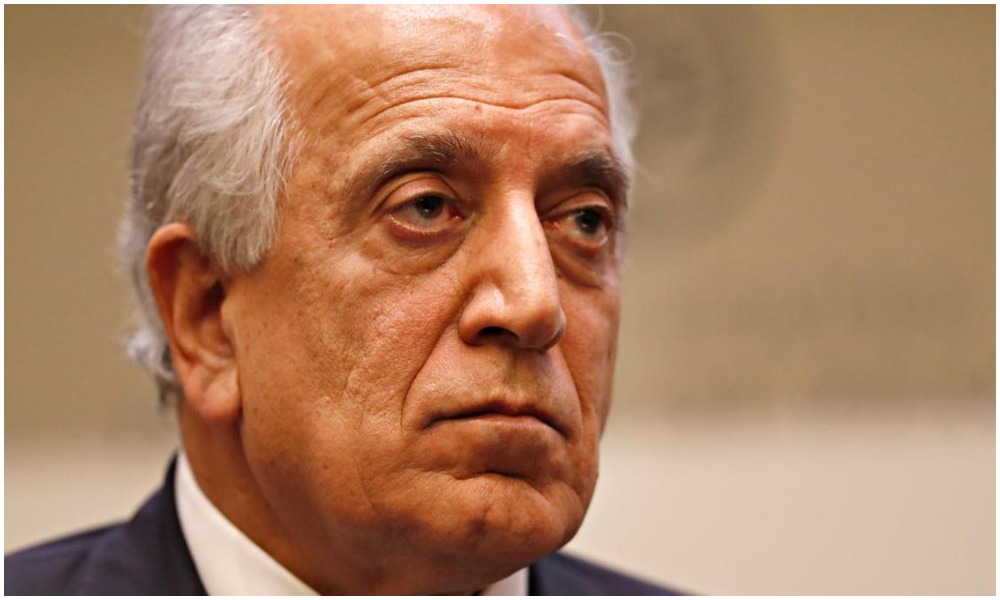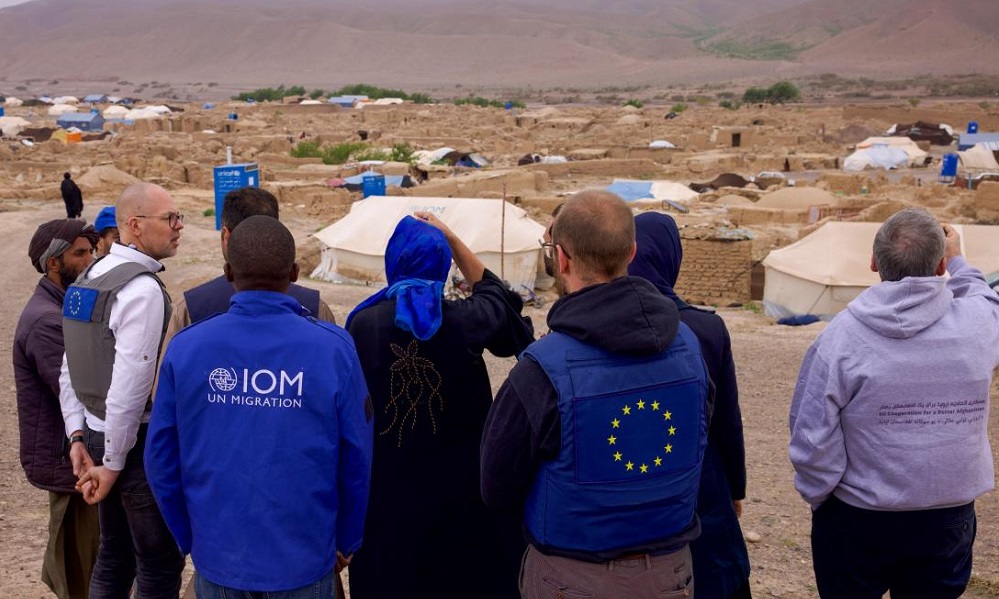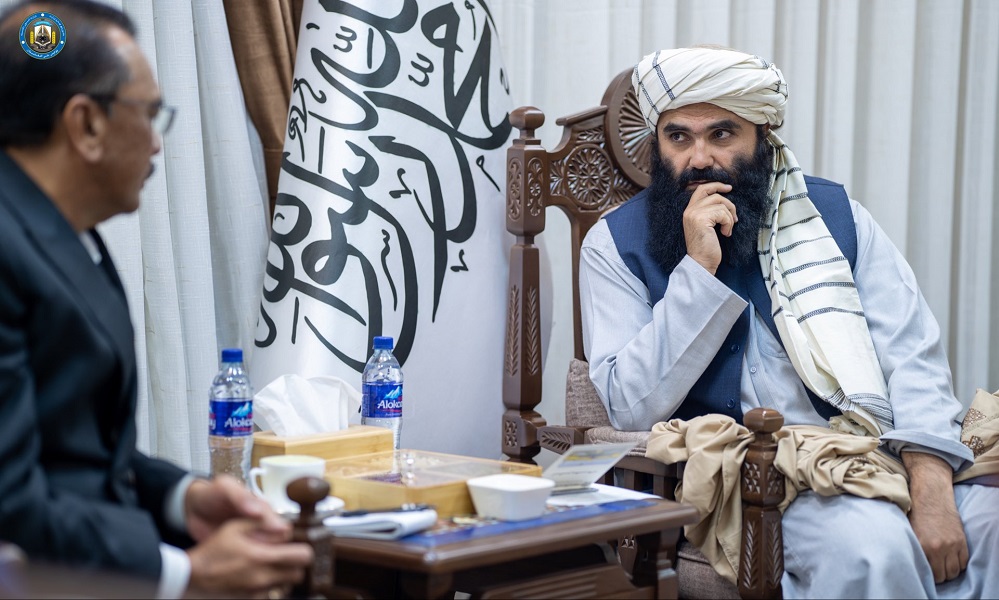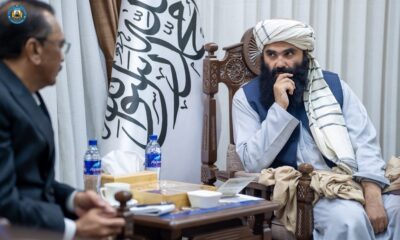Latest News
US was losing war to IEA so it turned to negotiations: Khalilzad

The United States was losing the war to the Taliban (IEA) so it chose negotiations as an alternative, said the former US special representative for Afghanistan Zalmay Khalilzad in an interview with CBS News.
According to him, Washington tried many times to strengthen its position on the battleground but it failed.
“We did not defeat them. In fact, they were making progress on the battlefield even as we were negotiating with them. And the reason we negotiated with them was because militarily things were not going as well as we would have liked. We were losing ground each year,” he said.
Khalilzad blamed former Afghan president Ashraf Ghani for the disintegration of Afghanistan’s security sector, saying his escape triggered the chaos i seen in Kabul as the US withdrew its troops.
“But I believe the biggest difficulty was that President Ghani and a few other Afghan leaders did not believe that we were serious about withdrawal for a long time, and they liked the status quo compared to a political settlement in which they might not have the jobs that they had and- and the resources that the US was providing would not be there.
“They preferred the status quo to a political settlement. And then when it became clear that the U.S. was leaving, then they- they miscalculated the effects of-of the continuing war. They were not serious about the political settlement,” he said.
and did not take into account the real situation in the country.
Khalilzad believes that the US counterterrorism mission in the country succeeded as “the terrorist threat from Afghanistan is not what it used to be” and al-Qaeda has been “devastated.”
He said the Islamic Emirate of Afghanistan (IEA) is living up to its agreement regarding al-Qaeda stating “we are convinced that they are not allowing- they are not allowing plotting and planning operations by al-Qaeda against the United States.
“We always would like to see more from the Taliban (IEA), from almost any country that we deal with on this issue. We would like them to do more. We would like to expel- to- to get them to expel any al-Qaeda member who was there.”
“We should press them to do more on the issue of terrorism,” he added.
Asked if he knew where the leader of al-Qaeda, Ayman al-Zawahiri was, Khalilzad said: “Well, the [UN] report that I have seen indicates he could be in Afghanistan or adjacent territories.”
However, he said the IEA members he negotiated with in Doha said they did not know where al-Zawahiri was.
He went on to say he did not necessarily believe this and said: “That’s why it’s very important not to take their word for it, in terms of what they say or what they commit to. That’s why we are saying there has to be over the horizon monitoring of the commitments on terrorism and the ability to strike if we see plotting and planning going on.”
On October 18, US Secretary of State Antony Blinken announced that Khalilzad had stepped down as a special envoy for Afghanistan.
Khalilzad said that he made the decision to resign at a time when Washington is beginning a new phase of policy toward Kabul following the withdrawal from Afghanistan in August.
“I was representing the United States to carry out the president’s direction. But I believe the biggest difficulty was that President Ghani and a few other Afghan leaders did not believe that we were serious about withdrawal for a long time, and they like the status quo compared to a political settlement in which they might not have the jobs that they had and- and the resources that the US was providing would not be there.
“They preferred the status quo to a political settlement, he said.
Khalilzad also stated that he would have liked to have seen a negotiated settlement but implied that Ghani did not give this a chance.
He said Afghanistan was close to his heart, especially as he had been born in the country.
“I was born there, and I have spent a lot of my life on behalf of the United States focused on Afghanistan. I helped them with their constitution. I helped them with their first election. I established an American university in-in Afghanistan.
“I was very encouraged by the first years, the enthusiasm, the hopefulness that I observed there,” he said adding that the “political elite of the country made terrible mistakes”.
He said they “allowed corruption, misused elections, democracy, and didn’t treat their security forces perhaps the way they should have been treated.
“And we faced the- the circumstances we did.”
In conclusion he said: “Now it’s time for the Afghans to take ownership with non-military assistance, unless we are threatened, then our military should be in play. But we should not abandon Afghanistan, turn our back on it — use our influence as a country with enormous capability and influence to encourage the emergence of an Afghanistan that the Afghans aspire for.”
Latest News
EU allocates 17 million euros to support Afghans on the move

The European Union signed an agreement worth 17 million euros with the International Organization for Migration (IOM) to improve access to basic services, increased economic opportunities and protection for Afghans on the move and their host communities in Afghanistan.
The needs of women and girls are a particular focus of the programme, EU said in a statement released on Thursday.
The statement noted that from January 2023 until April 2024, over 1.5 million Afghans returned from Pakistan and Iran.
“I am deeply moved by the hardship returnees face when being deported to Afghanistan. In a country suffering from poverty and climate change, and in a city that just saw devastating earthquakes, this truly is a crisis within a crisis.”, said Peteris Ustubs, Director for the Middle East, Asia and Pacific of the European Commission’s Department for International Partnerships during the signing ceremony at the IOM transit centre in Herat.
Raffaella Iodice, EU Chargée d’Affaires a.i. to Afghanistan, added “The solidarity of the Afghan people towards their brothers and sisters is an inspiration. We must assure that communities hosting and helping new arrivals are supported. The partnership with IOM ensures access to essential services and provides protection for Afghan returnees and their host communities. As women and girls can be particularly affected, we make sure that all members of society can benefit”.
“IOM’s continued partnership with the EU has been critical in enabling our teams to reach hundreds of thousands of Afghan returnees and other vulnerable communities in the country”, said IOM Afghanistan Chief of Mission, Maria Moita. “Thanks to this renewed commitment, we will be able to focus on addressing the immense challenges in the areas of return and contribute to reintegration, social cohesion, and longer-term solutions for those communities.”
This additional contribution is part of a 5-year programme that is being implemented across Afghanistan and in four countries in the region. It builds on the EU’s previous support to IOM to improve the wellbeing of Afghans forced to return to the country, EU said.
Latest News
Malaysia vows to share its experiences on cyber security with IEA

Acting Minister of Interior Affairs Sirajuddin Haqqani has said in a meeting with a delegation from Malaysia in Kabul that Malaysia is an advanced country and that Afghanistan should use is experiences.
According to a statement released by the Interior Ministry, Haqqani, in the meeting on Thursday, emphasized that security is ensured in Afghanistan and unity among Afghans has been restored.
He stated that the Islamic Emirate wants to have close relations and engagement with the world, especially Islamic countries.
The Malaysian delegation consists of representatives of the Ministries of Interior and Defense, and advisers of the Prime Minister’s Office.
According to the statement, a member of the delegation provided information about Malaysia’s capabilities in cyber security and tackling cyber crime, and said that Malaysia will share its experiences in this field with the Islamic Emirate.
In the meeting, the two sides also discussed the fight against drugs, police training, bilateral cooperation and exchange of experiences between Malaysia and Afghanistan.
Latest News
Girls’ education is a ‘vital issue’ for Afghanistan: Karzai

Former president Hamid Karzai said in a meeting with Iran’s ambassador and special representative, Hassan Kazemi Qomi, that education of girls was a “vital issue” for Afghanistan.
Karzai said he appreciated Iran’s cooperation and its standing with the Afghan people, especially Iran’s contributions to education in Afghanistan.
During the meeting, Karzai said peace and stability in the region are in the interest of all regional countries.
-

 Latest News5 days ago
Latest News5 days agoPakistan’s frontiers minister stresses ‘dignified’ return of Afghan refugees
-

 Latest News3 days ago
Latest News3 days agoRashid Khan named AWCC’s brand ambassador
-

 Regional4 days ago
Regional4 days agoIranian president lands in Pakistan for three-day visit to mend ties
-

 Climate Change5 days ago
Climate Change5 days agoMassive river flooding expected in China, threatening millions
-

 Sport4 days ago
Sport4 days agoKolkata beat Bengaluru by one run in IPL as Kohli fumes at dismissal
-

 Sport4 days ago
Sport4 days agoACL: Aino Mina 3-0 Istiqlal Kabul; Attack Energy 3-0 Khadim
-

 Climate Change4 days ago
Climate Change4 days agoRescuers race to reach those trapped by floods in China’s Guangdong
-

 Business5 days ago
Business5 days agoAfghanistan, Kazakhstan to hold joint expo in Kabul
























